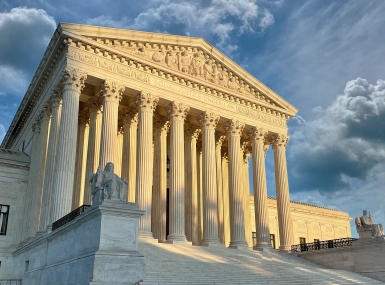NACo Legal Advocacy: Perttu v. Richards
Author

Paige Mellerio

Joe Jackson
Upcoming Events
Related News

County Nexus
Perttu v. Richards has implications on the Prison Litigation Reform Act (PLRA) and could increase the amount of Section 1983 inmate-initiated cases against county jails that reach federal court, ultimately resulting in counties having to expend resources on frivolous lawsuits.
Background
Under the Prison Litigation Reform Act (PLRA), which was enacted in response to over 40,000 inmate-initiated cases clogging federal courts, prisoners must try and resolve their complaint through the prison’s grievance structure, exhausting all available administrative procedures. Kyle Richards, an inmate at the Michigan Department of Corrections (MDOC) filed a complaint in court that Thomas Perttu, a Residential Unit Manager (RUM) employed by MDOC, retaliated against inmates and destroyed their property, therefore violating their First, Fifth and Eighth Amendment rights.
Ordinarily, the PLRA constrains Richards’ ability to go to court, but Richards is arguing that he has the right to go to court and obtain a jury under the Seventh Amendment since facts determining whether he exhausted available administrative remedies are intertwined with the merits of the case. The Sixth Circuit agreed with Richards, finding that the inmate’s Seventh Amendment rights are superior to the PLRA and a federal jury is appropriate whereas the Seventh Circuit held a conflicting opinion, finding that inmates have no right to a jury to determine whether they exhausted administrative remedies regardless of whether the exhaustion is intertwined with the merits of the case. Perttu cited the circuit split in petition for cert. and argues that the Sixth Circuit’s interpretation undermines Congressional intent and that “threshold issues” remedies do not implicate the Seventh Amendment.
NACo Advocacy
Stay tuned for a Local Government Legal Center amicus brief in support of the petitioner, Perttu, which will argue the Sixth Circuit’s ruling should be reversed based on the significant cost it could place on county governments as we support 91 percent of all local jails and the congressional intent of the PLRA to shield state and local governments from frivolous lawsuits.
Current Status
Oral argument scheduled for February 25, 2025.
2024-2025 Supreme Court Term

NACo Legal Advocacy: Ames v. Ohio Department of Youth Services
As one of the largest employers in the country, counties have a significant interest in cases like Ames v. Ohio Department of Youth Services (Ames v. Ohio) that could expand county liabilities as employers.

NACo Legal Advocacy: City of Seattle et al. v. Kia/Hyundai
The question at hand in City of Seattle et al. v. Kia/Hyundai is whether or not the Federal Motor Vehicle Safety Standard preempts state tort claims brought forth by local governments alleging that Kia and Hyundai’s failure to install “reasonable” anti-theft technology constitutes negligence and public nuisance.

NACo Legal Advocacy: Perttu v. Richards
Perttu v. Richards has implications on the Prison Litigation Reform Act (PLRA) and could increase the amount of Section 1983 inmate-initiated cases against county jails that reach federal court, ultimately resulting in counties having to expend resources on frivolous lawsuits.

NACo Legal Advocacy: McLaughlin Chiropractic Associates, Inc. V. McKesson Corporation
McLaughlin Chiropractic Associates, Inc. V. McKesson Corporation could make it more difficult for counties to challenge FCC orders, many of which have taken steps to preempt and curtail local authority by limiting counties’ abilities to manage their own right of way and assess fair market value permitting and impact fees on providers seeking to construct, modify or extend telecommunications infrastructure in their communities.

NACo Legal Advocacy: San Francisco v. Environmental Protection Agency (EPA)
San Francisco v. Environmental Protection Agency (EPA) has implications for the ability of county governments that own and operate wastewater treatment facilities to comply with National Pollutant Discharge Elimination System (NPDES) permit requirements.

NACo Legal Advocacy: Lackey v. Stinnie
Lackey v. Stinnie will impact the ability of state and local governments to avoid paying litigation fees in a civil rights case if they change their conduct (i.e. repeal a law) after a court has granted a preliminary injunction.

NACo Legal Advocacy: Bondi v. VanDerStok
Garland v. VanDerStok has implications for the ability of county law enforcement to uphold public safety and investigate crimes involving ghost guns.

NACo Legal Advocacy: Stanley v. City of Sanford
Stanley v. City of Sanford will impact the ability of county governments to balance budgets by reducing or eliminating post-employment benefits for disability retirees.

NACo Legal Advocacy: EMD Sales, Inc. v. Carrera
EMD Sales, Inc. v. Carrera could make it more difficult for county governments to prove exemptions under the Fair Labor Standards Act (FLSA), which would increase the potential for costly litigation.

NACo Legal Advocacy: Federal Communications Commission, et al v. Consumers' Research, et al
Federal Communications Commission, et al v. Consumers’ Research, et al. (FCC v. Consumers’ Research) could jeopardize what is known as the Universal Service Fund (USF). Through the USF, the FCC has provided billions of dollars to local governments and our residents, helping provide essential telecommunications and broadband services to unserved and underserved communities. FCC v. Consumers’ Research challenges the FCC’s legal authority behind the USF, putting multiple programs essential to equitable broadband deployment at risk.
Featured Initiative
Supreme Court Advocacy Hub

Related News

U.S. House reintroduces legislation to address the Medicaid Inmate Exclusion Policy
Two bipartisan bills aimed at addressing the Medicaid Inmate Exclusion Policy (MIEP) were recently reintroduced in the U.S. House of Representatives.

FEMA halts disaster mitigation grant program
On April 4, the Federal Emergency Management Agency (FEMA) announced it will not allocate $750 million this year for the Building Resilient Infrastructure and Communities (BRIC) grant program. According to the press release, FEMA will also stop funding BRIC projects that were previously approved and are still underway.

Counties support youth with a second chance opportunity
A Riverside County, Calif. supervisor took experiences from his former life as a teacher to help create a program that serves students who had gone the juvenile justice system and were looking for a second chance.